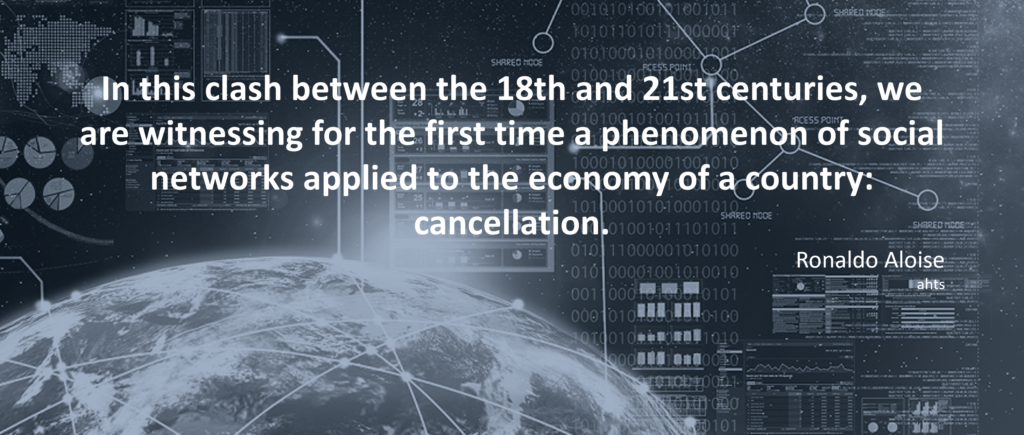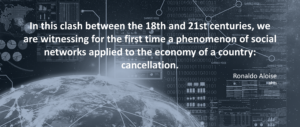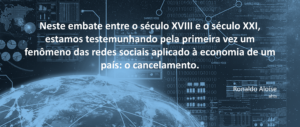In this clash between the 18th and 21st centuries, we are witnessing for the first time a phenomenon of social networks applied to the economy of a country: cancellation.
Ronaldo Aloise Jr. aht
From the title of this article, we can already see that I am venturing into a topic where I am no expert: military battles. But I write with caution and focus on the area I am more acquainted about: business transformation and evolution in the digital economy, where the battles are commercial and cyber.
Based on the response that the world gave to Russia due to the military attack on Ukraine, this war is global. We clearly see a geopolitical strategy from pre-19th century times, of annexation or domination of neighboring countries by force. And we see that fortunately the response was not war, but economic sanctions: while one side fights by land, sea and air, the world that supports Ukraine fights by the Network, both the social digital and the economic digital.
The world is already a network of interconnected economies, societies and tribes, and this network is not divided into East and West: it respects cultures and integrates communities. The governance of this network is global and self-sustaining, the network governs itself. The first lesson we learned is that the network is faster than anyone thought.
We are witnessing for the first time a social media phenomenon applied to a country’s economy: cancellation.
Ukraine does not want to be part of the West; it wants to be part of the democratic world and the global economy. The fact that Ukraine has reacted, no matter how painful it is for that people, does a good thing to the world: it refuses to give in to the last breath of an anachronistic mentality that is out of touch with current reality. It helps the world to avoid taking a step back in evolution.
Oil was once the flagship of wealth creation (and environmental disaster as well) on the planet, today wealth is in the exchange of information that feeds international transactions, the network infrastructure that sustains it and (strategically) in the semiconductors that process that data.
This leads us to think of China, which, much like the United States, has one of the strongest economies on the Web and cannot be isolated. And it must, as a 5,000-year-old country, do as it have always done: observe carefully and without haste, it loses more than it gains from unilateral involvement, it must rehearse itself as a global mediator and protect the network, the economy from which she depends so much on and fought so hard to dominate.
This situation should also lead China to ponder about Taiwan. All countries need semiconductors made there. Any action against Taiwan on the same way Russia has done in Ukraine would be disastrous. What needs to be done, quickly, is to deconcentrate and redistribute semiconductor production to other regions of the world.
In this era of interconnected and interdependent economies, if there is a war it will be commercial and digital, and Putin has just admitted that he is out of that group and that he is left to fight with the weapons of the last century.
In addition to interdependence, the new economy is measured by reputation, social reactions are instantaneous, not a minute can be lost when something compromises our brand, image, or flag. Even China itself has already stated that it is concerned about the damage to its reputation by its proximity to Russia (news aired on CNN on 03/11).
Social networks are quick to judge and banish, the Network often behaves as if it has antibodies, it isolates a tumor by shutting it down. And the big brands, in doubt, follow the judgment of social networks (in less than two weeks all the main big global brands have left Russia). And here’s an old saying: it costs five times more to replace a lost customer than to acquire a new one, it will take a long time for Russia to recover its reputation.
Geography is the physical that gives us energy, food and livelihood, the network is the digital that places us as a set of interconnected economies and different cultures that need to peacefully coexist to ensure both economic and environmental sustainability. That’s our future.
An economy is made of businesses, and, in the network, companies have no borders, it is up to us, generators of economic value, to act in favor of sustainability and dignity, respecting life and people. An example of this is tiny Estonia, which, once outside the Soviet community, became the country to perform the fastest digitization in the world. Today Estonia operates 100% online and is the world’s leading authority on cybersecurity, largely because of having to defend itself against its former sovereign.
Had it been looking to learn something from Estonia, Russia would have found valuable lessons about how to accelerate its economy and compete in the digital world. But then they would have to transform themselves profoundly, perhaps even Ukraine’s surprising resilience will not help accelerate this.
Link to the webinar on business transformation for the digital economy:
Ronaldo Aloise ahts ([email protected]) is a Mechanical Engineer with a postgraduate degree in Software Engineering from UFRGS. He graduated as an executive in the IT and Semiconductor Industry. He served for more than 30 years as a director of companies such as Intel, HP, Dell, Baan and Datasul.
He has also worked as Executive Vice President of HT Micron Semiconductors and Director of Datacom and Saque e Pague. He founded WayToGrow to promote the transformation and growth of companies in the digital economy, and acts as a partner and mentor of several Startups, including Thummi (www.thummi.org), of which he is CBO.






